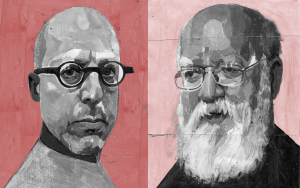 I thought David Eagleman’s book SUM was excellent – it’s a series of short accounts of the afterlife in which each version turns out to be surprising and disappointing in a variety of imaginative ways. So I looked forward to Incognito, his serious account of the conscious mind. The dazzling striped lettering on the dustjacket suggests we’re in for a lively read, and it does not mislead.
I thought David Eagleman’s book SUM was excellent – it’s a series of short accounts of the afterlife in which each version turns out to be surprising and disappointing in a variety of imaginative ways. So I looked forward to Incognito, his serious account of the conscious mind. The dazzling striped lettering on the dustjacket suggests we’re in for a lively read, and it does not mislead.
The first part of the book – the bulk of it in fact – is a highly readable account of many of the interesting and counter-intuitive discoveries of modern research about how the brain in general, and perception in particular, works. There are many old friends here – blindsight, split brains, and synaesthesia, and so on – but also some stuff that was new to me. If you want to know what Japanese chicken-sexers and WWII British plane spotters have in common, this is the book for you. In places I felt Eagleman’s account could have benefited from a few caveats and qualifications, and at times the breeziness of his explanation seems to carry him away. Is the tendency to talk freely about your life to anonymous strangers – people you might meet on a train journey for example – the ‘explanation’ for the continuance of confession in the Catholic church? Er, no: back to the drawing board on that one, I think. But in fairness this is essentially a popular account, not a scientific paper.
As the book progresses it becomes clear that Eagleman’s purpose is not merely to summarise interesting research: in fact, he’s been softening us up for some points of his own. He speaks warmly of Minsky’s Society of Mind, but suggests that to complete the picture we need to assume that there is an ongoing competition for control among the various agents running our minds. I don’t think this idea is quite as novel as Eagleman seems to suppose, and he goes on to make a very traditional use of it by drawing a distinction between a rational controller, able to defer gratification, and a short-term pleasure seeker. This sort of echoes Freud, and for that matter Plato’s charioteer.
In fact Eagleman’s main purpose is to change our view of moral responsibility and legal responses to crime. He spends some time quoting examples of people who committed crimes under the influence of drugs or brain tumours, and recounts the well-known story of Phineas Gage, whose behaviour was changed for the worse when a tamping iron was accidentally fired through his brain. This last example perhaps needs to be handled with a little more care than Eagleman gives it, as there are reasons for a degree of scepticism about how changed or how bad Gage’s behaviour became. Eagleman foresees a day when neuroscience will make it impossible to hang on to the idea that free will means anything or that anyone is ultimately responsible for anything – or as puts it blameworthy. I think Eagleman is giving up too quickly: without re-fighting the Free Will issue, aren’t there special faculties of planning and decision-making which conscious humans have and other creatures lack? If so, isn’t it worth appealing to them, and isn’t blame a tool for doing so?
Eagleman seems to have a bit of a campaign going against blame. His base is at Baylor College of Medicine in Houston where he directs the College’s Initiative on Neuroscience and Law (as well as the Eagleman Laboratory for Perception and Action). He approvingly quotes Lord Bingham:
In the past, the law has tended to base its approach… on a series of rather crude working assumptions: adults of competent mental capacity are free to choose whether they will act in one way or another; they are presumed to act rationally, and in what they conceive to be their own best interests; they are credited with such foresight of the consequences of their actions as reasonable people in their position could ordinarily be expected to have; they are generally taken to mean what they say. Whatever the merits or demerits of working assumptions such as these in the ordinary range of cases, it is evident that they do not provide a uniformly accurate guide to human behaviour.
At first sight it’s possible to read this as a liberal, even humane point of view: isn’t it ridiculous the way we blame and punish all these people for things they couldn’t really help? But a moment’s reflection shows that the noble lord is letting these common folk off their punishment only because he’s demoting them into a sub-human category. You know, he says, for some reason our legal system bends over backwards to treat people as if they were dignified creatures of some moral standing: it goes on treating them as worthy of admonition, worthy indeed of the honour of punishment, long after they have proved themselves to be pond life. You would almost think the law considered these people in some sense the equal of their judges!
The more I read the quote the less I like it.
Eagleman certainly has no truck with equality, and devotes a section to denouncing it. The question of whether equality of income is in itself a moral desideratum or an economic advantage, or the reverse, is of course politically contentious: but I had thought that no-one anywhere on the spectrum denied moral equality. Can Eagleman possibly mean that we don’t all equally deserve a fair hearing, natural justice, and to be judged by our actions alone? Reader, I fear he does.
In fact what Eagleman is advocating in practice is not clear to me in any detail, but a couple of points are well established. People will still go to jail, he is keen to emphasise: not in order to be punished, but in order to protect society. It follows, though Eagleman does not dwell on this, that they might stay in jail forever, if they continue to be deemed dangerous. Indeed, if neurolaw (it seems to be as much a matter of genetics and other factors as genuine neuroscience) gives them the thumbs down as high-risk future perps, it seems to follow that they might find themselves locked up before they’ve done anything.
The other point, a little more appealing, is that Eagleman believes people can be trained out of their vicious propensities. Crime, he suggests, occurs when the struggle between the different agents in our mind goes the wrong way: when the rational self loses out to the weak-willed glutton. He mentions experiments conducted by his colleagues, which use neural feedback to try to help people overcome their desire for chocolate cake: he thinks a similar ‘prefrontal workout’ might help criminals get ready to re-enter society. So perhaps they won’t be in jail long, after all?
But does crime really arise from weakness of will? Is it that everyone wants to be good, but sometimes some people give way to an immediate temptation? Isn’t that a rather minor part of the problem? I can’t help thinking what a sunlit, untroubled life Eagleman must have led – never having experienced in himself or having reason to suspect in others any of the deep dark recesses of the soul – if he thinks evil is more or less the same as finding it hard to stop eating chocolate cake.
Another instance of naivety seems embodied in the idea that in the pandemonic struggle of our minds one side is always good and the other bad. Suppose we train our criminals to overcome their temptations and enthrone the rational, long-term part of their brain – will that make them model citizens, or will they become psychopaths who’ve learnt to rein in the empathy and repugnance which would otherwise have prevented their crimes? Terrible things have been done on grounds that seemed entirely cold and rational to their perpetrators. Sometimes it’s better to leave Falstaff in charge: there may be a glut of chocolate cake, but the Battle of Shrewsbury gets cancelled.
Eagleman is aware of the poor precedents for science-driven justice, but he has a curious way of immunising his own mind against them. He describes the failure of psychologists to predict the rate of re-offending: he describes lobotomy with distaste, yet somehow he manages to construe both as relics of the traditional way of doing things rather than early attempts at the kind of science-driven crime management he too is advocating (of course, they got it wrong while he will get it right). He describes the plot of One Flew Over the Cuckoo’s Nest without seeming to realise how much the predicament of McMurphy resembles that of an inmate in a new Eaglemanic detention facility. When McMurphy was in jail, under the benighted old system, his punishment was limited to match his crime and when his term was up a system like that deplored by Lord Bingham persisted in trying to make a free moral agent of him again. In the asylum, as in Eagleman’s jail, you don’t get out till the men in white coats are pleased with you.
At the end of the day, I think there’s a fundamental concept missing from Eagleman’s analysis: justice. He’s not the only one in recent times to overlook it or mistake it for revenge, but I’ll go out on a limb and say that it’s fundamental. There is a moral imperative that we should ensure good behaviour leads to good things and bad behaviour to bad regardless of other considerations, and this is what lies at the root of all punishment. Deterrence and rehabilitation are additional benefits we should strive to secure, but justice is what it’s about. Only justice permits, in theory and often in practice, the exercise of governmental or judicial power: to put it aside, however beguiling the reason, is tyranny.
Coming off that high horse, I suppose we can thank Eagleman for stating explicitly conclusions which others have avoided or fudged, and thereby promoting the clarity of debate. He could go a bit further in setting out the implications of his theses and proposing what they might really mean in practice. There’s no doubting that our current judicial systems are far from perfect, and even if we reject Eagleman’s prescriptions, they might in the end help things move on.



 Should people be punished for crimes they don’t remember committing? Helen Beebee
Should people be punished for crimes they don’t remember committing? Helen Beebee  Is there a retribution gap? In an interesting and carefully argued
Is there a retribution gap? In an interesting and carefully argued  I thought David Eagleman’s book SUM was excellent – it’s a series of short accounts of the afterlife in which each version turns out to be surprising and disappointing in a variety of imaginative ways. So I looked forward to Incognito, his serious account of the conscious mind. The dazzling striped lettering on the dustjacket suggests we’re in for a lively read, and it does not mislead.
I thought David Eagleman’s book SUM was excellent – it’s a series of short accounts of the afterlife in which each version turns out to be surprising and disappointing in a variety of imaginative ways. So I looked forward to Incognito, his serious account of the conscious mind. The dazzling striped lettering on the dustjacket suggests we’re in for a lively read, and it does not mislead.